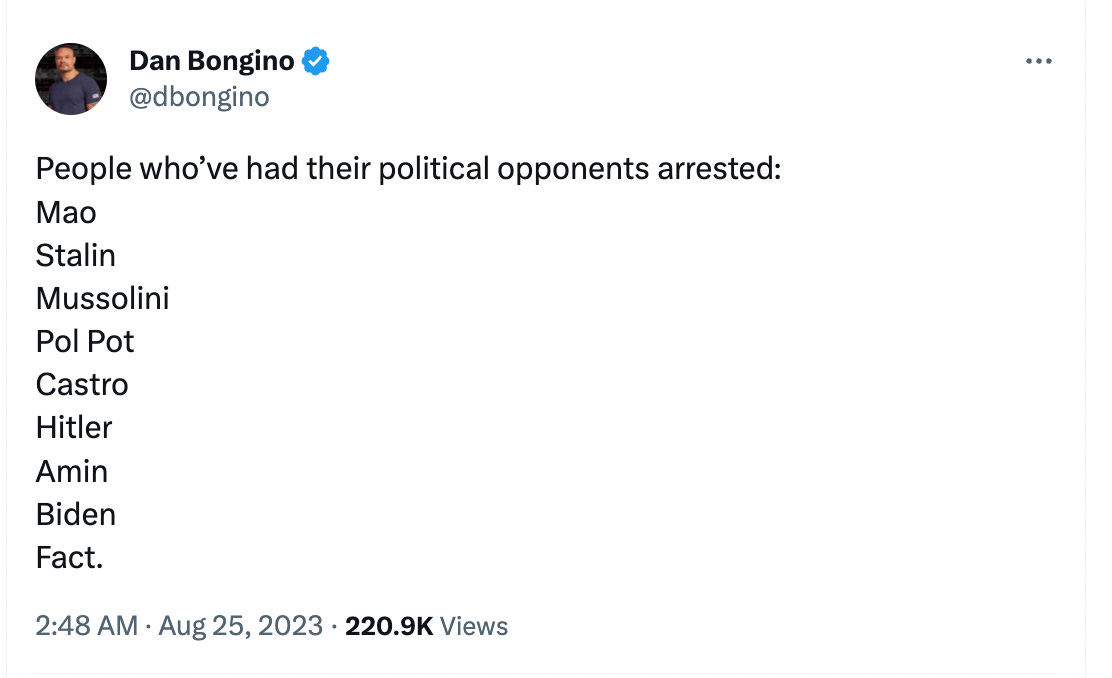Don't Miss the American Precedent for the Trump Indictments
Don't Miss the American Precedent for the Trump Indictments
There’s a whole lot of this sentiment on social media this morning, and I agree with it entirely:
But also read this. It’s important, and it’ll take you three minutes. Click on that link and read. You’ll see the point with every paragraph.
There are American precedents for the shameful acts of disgusting political lawfare being directed against Donald Trump (and his lawyers and political staff), and the most obvious and extremely telling precedent is the behavior of Federalists during the Adams administration. The Sedition Act of 1798 made criticism of the federal government a crime, on a comparable construction of the idea of “disinformation” that’s now used as a repressive tool: the law forbade “any false, scandalous, and malicious writing” about the government, subjective terms that in practice opened the prison doors to mere disagreement and ordinary political criticism. Federalists arrested and prosecuted newspaper editors and a congressman. Representative Matthew Lyon was imprisoned for criticizing the Adams administration.
But the effects of the Sedition Act are extremely important. Here’s a description from archives.gov — from a site run by the federal government:
The laws were directed against Democratic-Republicans, the party typically favored by new citizens. The only journalists prosecuted under the Sedition Act were editors of Democratic-Republican newspapers.
Sedition Act trials, along with the Senate's use of its contempt powers to suppress dissent, set off a firestorm of criticism against the Federalists and contributed to their defeat in the election of 1800, after which the acts were repealed or allowed to expire.
The criminalization of dissent by Federalists destroyed the Federalists. The party went into a hard decline; John Adams became the only Federalist president in our history (because Washington, sentimentally a federalist, declined to identify as a Federalist), though the party continued to be regionally important in New England until it finally destroyed itself at the Hartford Convention. The event that historians call the Revolution of 1800, the election of the Democratic-Republican Thomas Jefferson to the presidency, was in significant part a result of American disgust over the political repression of dissent 1. See this point clearly:
Federalists jailed their political opposition, so America loathed the Federalists and turned against them.
Note, in particular, what the imprisonment of the congressman Matthew Lyon did to Matthew Lyon, which you already know if you clicked on that link:
Instead of silencing Lyon, prison made a martyr of him. After forcing Lyon to take a circuitous route to the jail in order to display him triumphantly before the town citizens, the marshal assigned Lyon to a common cell that he shared with many other inmates. (One of Lyon’s judges was imprisoned for debt during Lyon’s term of imprisonment and was given a room of his own in the same jail.) The people of western Vermont responded to all of this by giving Lyon a landslide victory in his reelection campaign. The Vermonters also petitioned Adams to pardon Lyon and remit his fine, to no avail.
When Lyon left jail, he returned to Congress, where, helping to resolve the presidential election of 1800, he cast the tie-breaking vote for Thomas Jefferson over Aaron Burr. Lyon’s imprisonment had made civil liberties one of the major campaign issues of the election. His jailing illustrated the extent to which the Federalists were stifling the right to dissent. Jefferson’s victory gave him some vindication. Lyon moved to Kentucky in 1800 and continued to serve in the House until 1811.
That first sentence should have gotten your attention, right?
Federalists imprisoned a political opponent, so they made him a martyr, made civil liberties a major campaign issue, and got the imprisoned political opponent reelected.
Do I even have to finish the thought?
See also the High Federalist response to the Fries Rebellion, which treated a careful act of resistance as a dangerous insurrection. If you’ve never read about this one, I strongly recommend this book.
Source: Tell Me How This Ends


Comments
Post a Comment